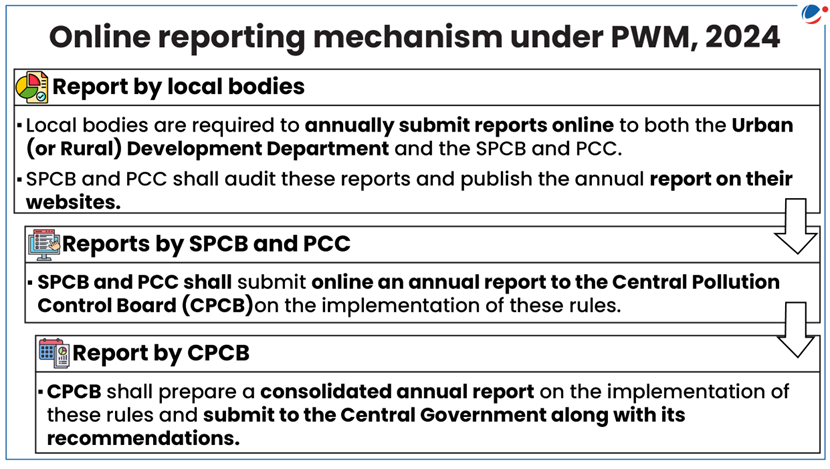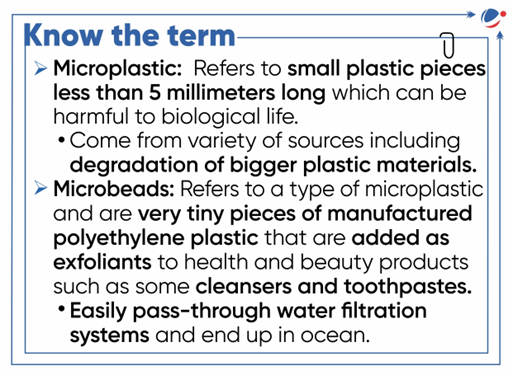Why in the news?
Recently, the Public Accounts Committee (PAC) presented a report titled "Pollution caused by Plastic" in Parliament, following which the government notified the Plastic Waste Management (Amendment) Rules, 2024 (PMW Rules 2024).
More on News
- The PAC report had highlighted various issues with respect to the Plastic Waste Management (PWM) Rules 2016.
- The recently notified PWM Rules 2024 have amended various provisions of 2016 Rules, which can be helpful address the challenges highlighted by PAC committee.
- The Centre amended the PWM Rules 2016, exercising the powers conferred to it under Sections 3, 6, and 25 of the Environment (Protection) Act 1986.
About Plastic Waste Management
|
Key provisions of PWM Rules, 2024
- Assessment Mechanism: According to the new rules, the Local body has been mandated to undertake an annual assessment of plastic waste generated, including plastic waste existing in dump sites. It will also estimate the quantity of plastic waste to be generated in following five-year period.
- Additionally, the 2024 rules mandate the manufacturer of commodities made from compostable or biodegradable plastics to report the quantity of such commodities introduced in the market and pre-consumer waste generated to the CPCB.
- Earlier the PAC had pointed out that there was a lack of mechanism for assessment of generation of plastic waste (current and future).
- Centralised Portal for Registration: The rules provide for an online centralized portal for registration for Producers, Importers, Brand-Owners and manufacturers of commodities made from compostable plastic or biodegradable plastic.
- It also provides for default registration where the registration is not granted within a period of thirty days after the receipt of application complete in all respect.
- Earlier the PAC had pointed out that Plastic units have been functioning without valid registration due to lackadaisical approach of Central Pollution Control Board (CPCB), SPCBs, etc.
- Elimination of Single Use Plastics (SUP): The 2024 rules now provide that Local body shall take necessary measures to prevent stocking, distribution, sale and usage of prohibited SUP items in their jurisdiction and submit annual report.
- Earlier the PAC had pointed out a delay in elimination of SUP as many states did not even ban them.
- Expansion of scope of EPR: The PAC had pointed out that there is an Absence of uniform framework for EPR hampering development of system for collecting and processing of plastic wastes.
- Now the Producers, Importers and Brand Owners who introduce any plastic packaging in the market shall be responsible for collection of such plastic packaging.
- The provision also extends to these stakeholders and manufacturers of commodities made from compostable or biodegradable plastics.
- The new rules also remove specific prescription for modalities to be developed by these stakeholders for waste collection system.
- Additionally, now the local body is responsible for development and setting up of infrastructure for segregation, collection, storage, transportation, processing and disposal of plastic waste either on its own or by engaging agencies (but not producers).
- Manufacturer, producer, importer, brand owner, manufacturer of commodities made from compostable plastics or biodegradable plastics may engage with local body on voluntary basis.
- Local body has also been mandated to assess plastic waste management infrastructure and report the same annually to the SPCB and PCC (Pollution Control Committee).
- Online Report Submission: The PAC had pointed out that incomplete and invalidated data is being channelised to MoEFCC by ULBs for decision making.
- The new rules, however, mandate online report submission to SPCB and PCC by
- manufacturer and importer (on quarterly basis),
- person engaged in recycling or processing of plastic waste (on annual basis),
- person engaged in sale of plastic raw material or an intermediate material used for manufacture of plastic packaging (on annual basis).
- The new rules, however, mandate online report submission to SPCB and PCC by
- Monitoring: For better monitoring of the rules, the 2024 Rules Provides for institutional mechanism that can facilitate effective monitoring and ensure accountability and transparency.

Other provisions of PWM Rules, 2024 that could be helpful in effective plastic waste management
- Changes in Definitions of stakeholders: Importer is one who imports for commercial use.
- Seller means a person who sells plastic raw material such as resins or pellets or intermediate material used for producing plastic packaging.
- Producer covers manufacture of intermediate material as well as in contract manufacturer.
- Broadens definition of manufacturer to cover manufacturers of compostable and biodegradable plastics.
- Precise definition of Biodegradable plastics: It refers to plastics, other than compostable plastics, which undergoes degradation by biological processes in specific environment like soil, landfill, sewage sludge, fresh water, marine, without leaving any micro plastics or visible or distinguishable or toxic residue.
- Certificate from FSSAI: Mandates manufacture of compostable or biodegradable plastics (or commodities) for certification from Food Safety and Standards Authority of India (for food contact applications) in addition to CPCB.
- Precise direction for labeling for different types of plastics
- For recycled: Label of ‘recycled’ shall specify the percentage of recycled plastic.
- Compostable: Product of compostable plastics shall bear a ‘label ―compostable only under industrial composting’.
- Biodegradable: Product made from biodegradable plastic shall bear label ‘Biodegradable’ which should also mention number of days and type of environment (soil, landfill, water etc.) under which it could be biodegraded.

Conclusion
The new rules are a welcome step towards curbing the plastic menace in India. The emphasis must now be effective implementation of the rules which will aid India towards a sustainable future.





